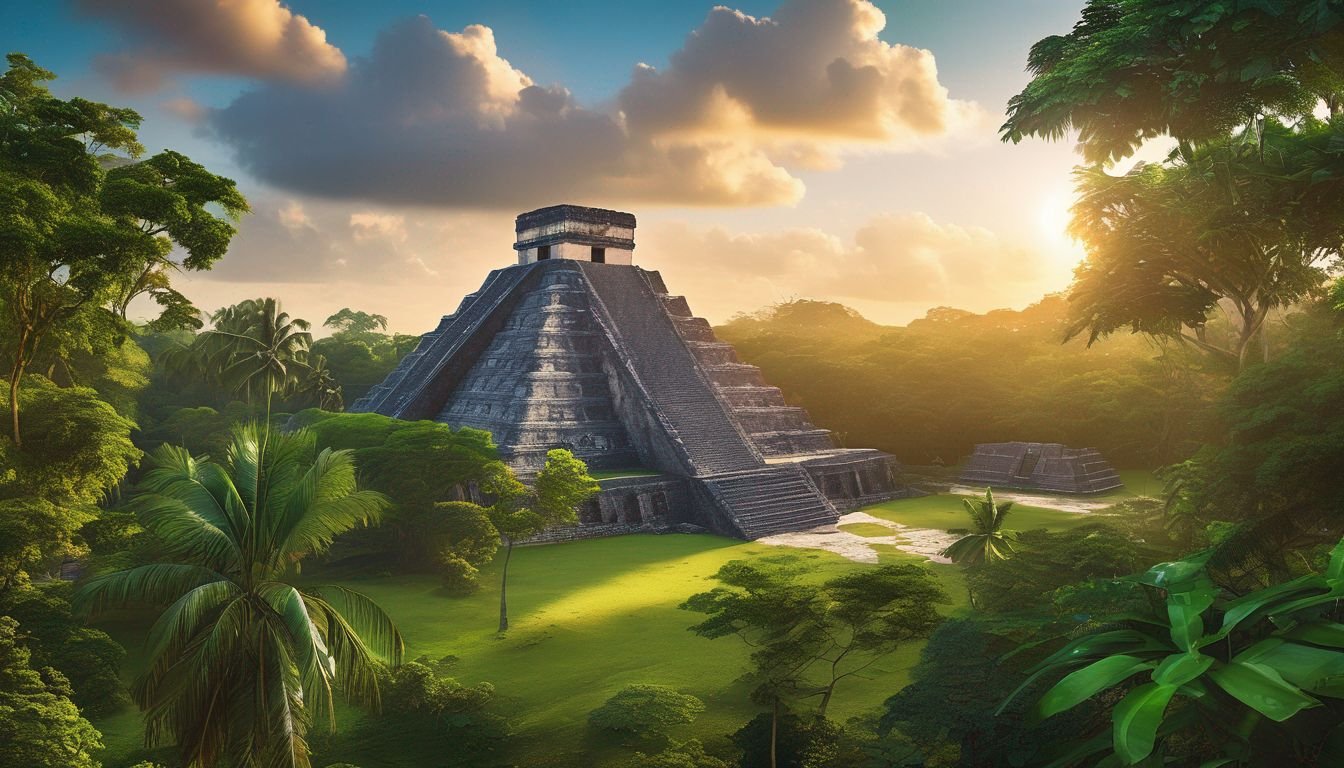In the heart of Mesoamerica, the Maya civilization thrived, leaving behind a rich cultural legacy. One of the most fascinating aspects of their culture is their naming tradition. Mayan names hold deep meanings and reflect the civilization’s connection to nature, spirituality, and social structures. This article explores the origins, significance, and evolution of Mayan names, offering a glimpse into the world of the ancient Maya.
Historical Context of Mayan Names
Origins of the Maya Civilization
The Maya civilization began in the Pre-Classic Period and reached its peak during the Classic Period between 250 AD and 900 AD. During this time, the Maya established many large urban centers and made significant advancements in art and architecture. Their unique culture and indigenous languages led to distinct names for people, gods, and places, each with symbolic meanings. Even today, many Maya people use names that were common in ancient times.
Influence of Neighboring Cultures
The Maya civilization did not exist in isolation. They interacted with neighboring cultures, such as the Olmecs and the Aztecs, which influenced their naming conventions. These interactions led to a rich tapestry of names that reflect a blend of different cultural elements. For example, some names might have roots in the Olmec language, while others could be influenced by Aztec traditions.
Evolution of Mayan Language
The Mayan language has evolved over thousands of years. Initially, it was a single language, but over time, it branched into multiple dialects. This evolution is reflected in the etymology of Mayan names. Some names have ancient roots, while others have adapted to changes in the language. This linguistic diversity adds another layer of complexity to the study of Mayan name history.
Understanding the historical context of Mayan names helps us appreciate their deep cultural significance and the rich history they represent.
Cultural Significance of Names in Mayan Society
Names as Symbols of Nature
In Mayan culture, names often reflect the natural world around us. Many names are inspired by elements of nature such as animals, plants, and celestial bodies. This practice highlights the deep connection the Maya people have with their environment and their appreciation for its beauty and power.
Spiritual and Religious Connotations
Mayan names frequently carry spiritual and religious meanings. These names are not just labels but are imbued with symbolism that connects individuals to their gods and spiritual beliefs. For example, a name might be chosen to honor a deity or to invoke certain qualities or blessings from the spiritual realm.
Names Reflecting Social Status
In Mayan society, names can also indicate a person’s social status or role within the community. Certain names are reserved for nobility or leaders, while others might be more common among the general populace. This practice underscores the importance of heritage and lineage in Mayan culture, as well as the societal structure that defines their way of life.
The cultural significance of names in Mayan society is profound, reflecting their deep connection to nature, spirituality, and social hierarchy.
Common Themes in Mayan Names
Nature and Animals
Mayan names often reflect the deep connection the Maya had with nature. Many names are inspired by animals, plants, and natural phenomena. For example, the name “Balam” means “Jaguar,” symbolizing strength and power. Similarly, “K’an” means “Snake,” highlighting the serpent’s importance in Mayan culture.
Celestial Bodies and Phenomena
The Maya were keen observers of the sky, and this is evident in their names. Names like “Ek,” meaning “Star,” and “Xaman,” meaning “North Star,” show their fascination with celestial bodies. These names often carried significant meanings related to guidance and inspiration.
Mythological and Heroic Figures
Mayan mythology and hero tales also play a crucial role in naming. Names such as “Hunahpu,” which means “One Blowgunner,” are derived from mythical heroes. These names often symbolize bravery, wisdom, and other admired qualities.
In Mayan culture, names are more than just labels; they are a reflection of the people’s relationship with the world around them, their beliefs, and their aspirations.
Mayan Names and Their Meanings
In this section, we explore the meaning behind various Mayan names. These names often reflect the rich cultural and spiritual heritage of the Maya civilization. Let’s delve into the different categories of Mayan names and their significance.
Names Derived from Deities
Mayan names frequently draw inspiration from their gods and goddesses. For instance, the name Ixchel means “Rainbow Lady” and refers to the Moon Goddess. Similarly, Kukulkan is named after the Feathered Serpent deity. These names not only honor the deities but also imbue the bearers with their divine qualities.
Names Inspired by Natural Elements
Nature played a crucial role in Mayan life, and this is evident in their names. Balam, meaning “Jaguar,” symbolizes strength and power. Another example is Pakal, which translates to Sun King, reflecting the importance of the sun in Mayan culture. These names often serve as a reminder of the individual’s connection to the natural world.
Names Reflecting Personal Qualities
Mayan names can also highlight personal attributes or desired traits. For example, Ahau means “Lord” or “Ruler,” signifying spiritual leadership. Aj translates to “Cane,” representing resilience and growth. These names are often chosen to inspire the individual to embody these qualities.
The Mayan tradition of naming is a beautiful blend of spirituality, nature, and personal aspiration. Each name carries a story, a piece of history, and a hope for the future.
Gender-Specific Mayan Names
In Mayan culture, names often carry deep meanings and reflect various aspects of life, nature, and spirituality. While there are distinct names for males and females, some names can be used for both genders. Let’s explore the different categories of Mayan names based on gender.
Male Names and Their Meanings
Mayan male names often signify qualities that parents wish to see in their sons. For example, the name Aapo means “father of many nations,” and Eadric translates to “wealthy monarch.” Other common male names include Hagen, meaning “the highest son,” and Taavi, which means “adored.”
Female Names and Their Meanings
Just like male names, Mayan girl names also have specific meanings. A common female name is Abarrane, which means “mother of multitude.” Another example is Abi, meaning “my father’s delight.” Other popular girl names include Abha, which means “brightness,” and Fabia, meaning “lovely bean.”
Unisex Names in Mayan Culture
Some Mayan names are used for both males and females. For instance, the name Xiang, meaning “good luck,” is a unisex name. Other examples include Hadley, which means “meadow of heathers,” and Hai, meaning “coming from the sea.” These names reflect the flexibility and inclusiveness of Mayan naming conventions.
Itzel is a feminine name of Mexican and Mayan origin that can perfectly reflect a baby’s bright and colorful personality.
Mayan Names of Historical Figures
Names of Kings and Rulers
The Maya civilization had many powerful kings and rulers whose names have been passed down through history. For example, the first ruler of the famous city of Tikal was Yax Ehb’ Xook, who founded the Tikal dynasty around the 1st century AD. Other notable rulers from Tikal include Ix Une’ B’alam, K’inich Ehb’, Ma’Kin-na Chan, and Kaloomte’ B’alam. From the city of Copan, we have rulers like K’inich Popol Hol, Wil Ohl K’inich, K’ak’ Chan Yopaat, and K’ak’ Yipyaj Chan K’awiil. The rival city of Calakmul had rulers such as Tajoom Uk’ab K’ahk’, Tuun K’ab’ Hix, Wamaw K’awiil, and Yuknoom Ti’ Chan.
Names of Female Leaders
Female rulers also played significant roles in Mayan history. One such leader was Lady Yohl Ik’nal, who ruled the city-state of Palenque in the 6th century AD. Another prominent female ruler was Ix Sak K’uk’, who took the throne of Palenque after her father, Janaab’ Pakal, passed away. Lady Ik’ Skull was another influential female leader who governed the city of Yaxchilan in the 8th century.
Names of Mythical Heroes
Mayan mythology is rich with heroic figures whose names are still remembered today. One such hero is Hunahpu, known as “One Blowgunner,” who played a crucial role in Mayan myths. Another important figure is Kukulkan, the Feathered Serpent deity, who is often depicted as a hero in various stories. These names not only reflect the bravery and strength of these figures but also their deep connection to Mayan spiritual beliefs.
Modern Usage of Mayan Names

Revival of Ancient Names
In recent years, there has been a renewed interest in ancient Mayan names. Many parents are choosing to name their children after historical figures and deities from the Mayan civilization. This trend is not just limited to regions with a direct Mayan heritage but has also spread globally, including places like Japan. The revival of these names is a way to honor and preserve the rich cultural heritage of the Maya.
Contemporary Adaptations
Modern Mayan name ideas are still used today! This list features names that are both beautiful and trendy. Some names have been adapted to fit contemporary tastes while retaining their original meanings. For example, names like Iker, Xavi, Mateo, Emiliano, and Thiago have gained popularity. These names are not only unique but also carry a sense of history and tradition.
Mayan Names in Popular Culture
Mayan names have also found their way into popular culture. From movies to books, these names are being used to add an element of mystique and historical depth. The name popularity of Mayan names in popular culture has helped in keeping the tradition alive and introducing it to newer generations. Whether it’s a character in a novel or a protagonist in a film, Mayan names continue to captivate and inspire.
The resurgence of Mayan names in modern times is a testament to their enduring appeal and cultural significance. As we continue to explore and appreciate these names, we keep the legacy of the Maya civilization alive and thriving.
Regional Variations in Mayan Names
Names in Different Mayan City-States
The Maya civilization was not a single, unified entity but rather a collection of city-states, each with its own unique culture and traditions. This diversity is reflected in the names used in different regions. For example, the name Calakmul, one of the most important Mayan cities during the Classic Period, means “city of the two adjacent pyramids.” Similarly, Chichen Itza, another significant urban center, translates to “at the mouth of the well of the Itza.” These names often held specific meanings relevant to their locations.
Influence of Local Dialects
Local dialects played a crucial role in the name variations across different Mayan regions. The pronunciation and meaning of names could change significantly from one area to another. For instance, the name Tikal, derived from “ti ak’al” in the Yucatec Maya language, means “at the waterhole.” Such variations highlight the rich linguistic diversity within the Maya civilization.
Regional Deities and Their Impact on Names
The deities worshipped in different regions also influenced the names given to people and places. In some areas, names were inspired by local gods and goddesses, reflecting the spiritual and religious beliefs of the community. For example, the name Kukulkan, meaning Feathered Serpent deity, was more prevalent in regions where this deity was particularly revered. This practice underscores the deep connection between name pronunciation and regional religious practices.
The Maya civilization’s regional diversity is a testament to its rich cultural tapestry, where names serve as a window into the unique traditions and beliefs of each city-state.
Mayan Names in Archaeological Discoveries
Inscriptions and Hieroglyphs
When we explore ancient Mayan sites, we often find inscriptions and hieroglyphs that reveal much about their culture. These writings, carved into stone or painted on pottery, often include names of important figures, deities, and places. They provide a glimpse into the lives and beliefs of the Maya people.
Artifacts Bearing Names
Artifacts such as pottery, jewelry, and tools frequently bear names or symbols that identify their owners or creators. These items help us understand the social and economic structures of Mayan society. For example, a beautifully crafted vase might bear the name of a noble or a deity, indicating its significance.
Significance of Names in Archaeological Context
The names we uncover in archaeological digs are more than just labels; they are keys to understanding the Mayan world. They tell us about the individuals who lived, ruled, and worshipped in these ancient cities. By studying these names, we can piece together the history and culture of the Maya civilization.
Mayan Names in Literature and Art
Depictions in Mayan Codices
Mayan codices are ancient books that provide a glimpse into the rich tapestry of Mayan life. These codices often feature names of deities, rulers, and mythological figures. The Dresden Codex, for instance, includes detailed astronomical tables and references to gods like Chaac, the rain deity. These texts are invaluable for understanding how names were used in religious and daily contexts.
Names in Mayan Poetry
Mayan poetry is another treasure trove of names. Poems often celebrate nature, heroes, and gods, embedding their names within the verses. This practice not only honored these figures but also preserved their stories for future generations. The poetic structure allowed for a rhythmic and memorable way to pass down important cultural narratives.
Representation in Modern Literature
In contemporary times, Mayan names continue to inspire authors and artists. Modern literature often incorporates these names to add depth and authenticity to stories set in or inspired by Mayan culture. This revival helps keep the ancient traditions alive and introduces them to new audiences. Whether in novels, poems, or plays, the use of Mayan names enriches the narrative and connects the past with the present.
The influence of Mayan culture on present-day art is undeniable, as seen in the continued use of traditional names in modern creative works.
The Process of Naming in Mayan Culture
In Mayan culture, the process of naming was deeply rooted in tradition and carried significant meaning. Names were not just labels but were believed to influence a person’s destiny and character. Let’s explore the various aspects of this fascinating process.
Rituals and Ceremonies
Naming a child in Mayan society was often accompanied by elaborate rituals and ceremonies. These events were designed to invoke blessings from the gods and ensure a prosperous future for the child. The ceremonies could include offerings, prayers, and sometimes even feasts, reflecting the community’s collective hopes and aspirations for the newborn.
Role of Priests and Elders
Priests and elders played a crucial role in the naming process. They were considered the keepers of ancient knowledge and were responsible for selecting names that aligned with the child’s birth date, time, and other astrological factors. Their deep understanding of the Mayan language and its symbolic meanings was essential in choosing a name that would bring good fortune.
Naming Conventions and Traditions
Mayan naming conventions were influenced by various factors, including name associations with nature, deities, and ancestral lineage. For instance, names might be inspired by celestial bodies, animals, or natural elements, each carrying its own set of attributes and significance. This practice ensured that the name would resonate with the individual’s personality and life path.
The process of naming in Mayan culture was a profound and meaningful tradition, reflecting the community’s values and beliefs. It was a way to connect the individual with their heritage and the natural world around them.
Conclusion
In conclusion, the name Mayan carries with it a rich tapestry of history, culture, and spiritual significance. From the ancient rainforests of Mesoamerica, the Maya civilization has left an indelible mark on the world through their profound connection to nature and the cosmos. Their names, whether of gods, rulers, or common people, reflect a deep reverence for the world around them and the mysteries of life. Today, these names continue to be a testament to the enduring legacy of the Maya people, reminding us of their wisdom, creativity, and the timeless beauty of their culture. As we explore and understand these names, we gain a deeper appreciation for the Maya civilization and its lasting impact on history.
Key Takeaways
- Mayan names often have deep connections to nature, celestial bodies, and spiritual beliefs.
- The Maya civilization had a rich tradition of naming, with names reflecting social status and personal qualities.
- Many Mayan names are derived from deities, natural elements, and mythological figures.
- There are distinct male, female, and unisex names in Mayan culture, each with specific meanings.
- The tradition of Mayan names continues to influence modern naming practices in regions with Mayan heritage.
Frequently Asked Questions
What is the origin of the Maya civilization?
The Maya civilization began in the Mesoamerican region, with its roots tracing back to around 2000 BCE. It flourished during the Classic Period from 250 AD to 900 AD.
What is the difference between ‘Maya’ and ‘Mayan’?
‘Maya’ refers to the people and their culture, while ‘Mayan’ refers to their language.
Did the Maya civilization disappear?
No, the descendants of the ancient Maya still live in the regions of their ancestors and continue to practice many of their traditional customs.
What are some common themes in Mayan names?
Mayan names often reflect nature, celestial bodies, mythological figures, and personal qualities.
How did the Maya choose names for their children?
Names were often chosen based on nature, spiritual beliefs, and the qualities parents wished to see in their children. Rituals and ceremonies played a significant role in the naming process.
Are there gender-specific names in Mayan culture?
Yes, there are specific names for males and females, although some names can be used for both genders.
What is the significance of Mayan names in archaeology?
Mayan names found in inscriptions and hieroglyphs provide insights into their history, culture, and social structure.
How are ancient Mayan names used today?
Many ancient Mayan names are still in use today, either in their original form or adapted to contemporary culture.





